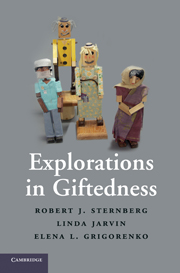Book contents
- Frontmatter
- Contents
- Preface
- 1 What Is Giftedness?
- 2 Theories of Giftedness
- 3 WICS as a Model of Giftedness
- 4 Intelligence and Giftedness
- 5 Creativity and Giftedness
- 6 Wisdom and Giftedness
- 7 Giftedness as Developing Expertise
- 8 Giftedness and Culture
- 9 Learning Disabilities, Giftedness, and Gifted/LD
- 10 Identifying the Gifted
- 11 Educating the Gifted
- References
- Index
1 - What Is Giftedness?
Published online by Cambridge University Press: 05 June 2012
- Frontmatter
- Contents
- Preface
- 1 What Is Giftedness?
- 2 Theories of Giftedness
- 3 WICS as a Model of Giftedness
- 4 Intelligence and Giftedness
- 5 Creativity and Giftedness
- 6 Wisdom and Giftedness
- 7 Giftedness as Developing Expertise
- 8 Giftedness and Culture
- 9 Learning Disabilities, Giftedness, and Gifted/LD
- 10 Identifying the Gifted
- 11 Educating the Gifted
- References
- Index
Summary
The Montgomery County, Maryland, public schools decided in December of 2008 to scrap the gifted label (De Vise, 2008; Stabley, 2008). According to school officials, erasing the label does not matter because gifted instruction is still available – to all students. Not all parents have been pleased with this decision: “If Montgomery school officials don't ‘give these kids a name, they can ignore the real fact they exist,’ Lori White Wasserman, a parent, wrote on an e-mail list for advocates of gifted instruction in the county” (quoted in De Vise, 2008).
The school officials had reasons for their decision. How good the reasons were is a matter of debate.
First, Montgomery County is a district in which, according to De Vise (2008), most if not all parents think their children are above average. One is reminded of Garrison Keillor's mythical Lake Wobegon, where all the children are above average (Garrison Keillor quotes, 2009). So some parents were apparently offended when their children were not identified as gifted.
Second, Montgomery County is among those school districts that are extremely competitive. Its schools are nationally, and perhaps internationally, famous and students work very hard to compete in a pressured atmosphere. Dropping the “gifted” label is one effort to decrease the competition and the marks of separation among the students in the district.
- Type
- Chapter
- Information
- Explorations in Giftedness , pp. 1 - 13Publisher: Cambridge University PressPrint publication year: 2010



